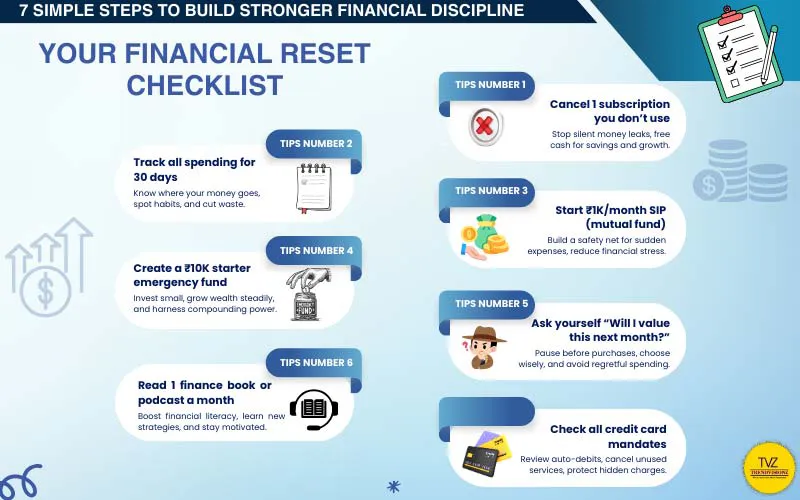No one goes broke over a ₹300 coffee—or do they? It starts small. A cab instead of the metro. A spontaneous Swiggy order when groceries are sitting in the fridge. A weekend trip booked on EMI because “you only live once.” Individually, these seem harmless. But over time, these little indulgences pile up, quietly draining your future. This isn’t a budgeting issue—it’s a slow leak in your financial discipline.

For college students and freshers in their first job, the thrill of independence comes with a trap: the illusion that small money decisions don’t matter. We’ve all heard of financial disasters caused by big risks—bad investments, job loss, debt spirals. But what about the everyday choices that don’t feel dangerous?
When Rahul, a 24-year-old coder, realized he had nothing in his emergency fund after a minor surgery, it wasn’t because he didn’t earn enough. It was because his wallet had a thousand tiny holes—untracked subscriptions, late-night food apps, casual shopping.
This guide is your wake-up call. We’ll break down how slow financial suicide creeps in, how to build financial literacy, and how to regain control. If you’re serious about building wealth, it starts with mastering personal finance one decision at a time. Every choice — whether you spend, save, or invest — shapes the wealth you’ll carry forward.
Stay with me till the end of this article to download a free PDF guide: ‘The Wealth Blueprint: 7 Steps for Your 20s’. It’s a simple, actionable checklist designed to help you avoid slow financial suicide and build lasting discipline.”
Also Read:
- Minimise Property Tax in the UK: A Buyer’s & Owner’s Guide
- 10 Strategies for Building Financial Wealth: Your Pathway to Abundance
- Private Label Cosmetics: An Innovative Solution for Brands and Start-ups
The Myth of the Big Blunder
When we think of financial collapse, we picture huge events—failed startups, stock market losses, or gambling addictions. But for most people in their 20s, financial discipline doesn’t disappear overnight. It fades slowly, often unnoticed.

Take this: If you spend just ₹50 a day on “extras”—a streaming subscription, a cab instead of the metro, or a dessert you didn’t need—that’s ₹18,000 a year. In five years, that’s ₹90,000. No drama, no disaster—just slow damage.
The Small Spends That Secretly Drain You
This is how financial decline works. Not like a crash, but like a phone battery that dies 1% at a time.
We don’t question the ₹699 OTT subscription we barely use. Or the ₹1,200 weekend food delivery even when groceries are at home. That Uber at midnight when the bus was still running? It adds up.
For college students and young professionals, these are lifestyle choices disguised as necessities. But without budgeting, the line between comfort and chaos blurs.

When these small habits become routine, financial stress in college students becomes the norm. Not because they’re reckless—but because they’ve never been taught how everyday decisions shape their personal finance future.
Mastering money isn’t about avoiding failure. It’s about managing the invisible.
The “Just Once” Trap
“That one party cost me ₹4,000, but it was worth it.”
Maybe it was. But what about the next one? And the one after that?
Most people don’t overspend all at once. It’s the “just once” mindset that breaks financial discipline over time. A new phone on EMI. A fancy dinner. A weekend trip on a credit card. These aren’t bad in isolation—but when repeated, they sabotage your personal finance goals.
The Real Cost of “Just This Once”
Take weekend parties, ₹3,000–₹5,000 each time. Two in a month, and you’re already touching ₹10,000. That’s the start of financial stress in college students and first-jobbers who are trying to balance fun with bills.
Then there’s the gym membership you swore you’d use—but haven’t touched in two months. The gadget EMI you forgot to include in your budgeting plan. A friend’s destination wedding you couldn’t say no to.

These aren’t rare expenses. They’re habits in disguise.
Action Tip
Create a “Guilt List.” Write down everything you justify with “just this once.” Add up the total for the month. You’ll be shocked at how these quiet choices add up.
Every swipe you make today is a step away—or toward—building wealth. The choice isn’t about saying no. It’s about knowing when to say yes.
Earn More, Save Less? You’re Doing It Wrong
Earning ₹1 lakh a month sounds like financial freedom. But if you’re spending ₹95,000 of it, you’re not building wealth—you’re burning through it.
This is one of the biggest money traps young professionals fall into. The belief that higher income automatically means financial security. But without financial discipline, that money disappears faster than it comes in.

Wealth isn’t built through earning alone. It’s built through consistent, intentional decisions.
Budgeting and planning make the real difference
Take two people with the same ₹80K salary. One starts a ₹2,000 SIP and sets up a small emergency fund. The other lives paycheck to paycheck, relying on last-minute credit card payments. A year later, one has peace of mind and growing investments. The other has debt, stress, and no savings to show for it.
That’s where budgeting, financial planning, and smart personal finance habits come in. They don’t limit your lifestyle—they give it direction.
The truth? Income opens the door. But discipline decides whether you walk through it—or stay stuck on the threshold.
Action Tip:
Set up automatic savings rules. Every time your salary hits your account, move 20–30% into a separate savings or investment space. The less you have to think about it, the more consistent you’ll be.
Also Read:
- Indigo Airlines Case Study: From Runways to Soaring High
- BoAt Case Study: How a Homegrown Brand Conquered the Indian Audio Market
- Raymond Case Study: Charting the Growth of an Apparel Industry Leader
How Self-Awareness Builds Financial Strength
One of the biggest gaps in personal finance today isn’t knowledge—it’s awareness. Most people don’t realize where their money is actually going until it’s already gone. That’s where financial literacy begins: not with investment hacks or budgeting apps, but with brutally honest self-tracking.
You don’t need a finance degree to understand your money. You just need to pay attention. How much did you spend last weekend? Did you save anything from your salary this month? What does your net worth look like—even if it’s negative? These answers may be uncomfortable, but they’re essential.

Financial success isn’t about perfection. It’s about patterns. And the more aware you become of your financial behavior, the more control you’ll have over it. Whether you’re a college student or someone in their first job, building this habit early is what shapes long-term financial discipline and helps in building wealth—not by accident, but by design.
Books That Build Money Mindset and Self-Awareness
Financial literacy isn’t just about learning how to save or invest. It’s about understanding why we make the money decisions we do—and how to shift those patterns. If you’re just starting your journey, reading the right book can completely rewire how you view personal finance, discipline, and long-term planning.
Here are three top-rated and best-selling books that help you build not just knowledge—but financial self-awareness:
The Psychology of Money – Morgan Housel
Learn how your mindset and behavior silently shape your financial future, beyond just income and investing.
Rich Dad Poor Dad – Robert Kiyosaki
Understand how the rich think differently—turn income into assets, and build wealth through smart decisions.
Let’s Talk Money – Monika Halan
A beginner-friendly Indian guide to budgeting, saving, mutual funds, insurance, and building long-term financial discipline.
How to Start a Sunday Self-Audit
Think of this as your weekly reality check. A Sunday Self-Audit isn’t about judgment—it’s about awareness. Just 20 minutes a week can help you reset your habits, track your progress, and take control of your personal finance story.
- Block 20 minutes every weekend—same time, same day
- Go through your last 7 days of expenses (manually or with an app)
- Note anything impulsive, unnecessary, or surprising
- Check whether you added to your emergency fund or savings
- Reflect: Are your daily actions aligned with your monthly goals?
This simple habit builds self-trust, clarity, and a better money mindset—week after week.
The Cost of Not Planning Ahead
In your 20s, skipping financial planning feels harmless. You’re healthy, employed, and focused on living in the moment. But that’s exactly when the most expensive financial mistakes are made. Take Aditya, 26, who faced an unexpected medical emergency. With no emergency fund, no health insurance, and no savings system in place, he had to borrow ₹50,000 just to cover hospital bills. The financial setback wasn’t just about the money—it brought with it stress, panic, and a long road to recovery.
Young professionals often underestimate how quickly things can spiral without a basic plan. A missed premium or a delayed salary can push you into high-interest debt, simply because you weren’t prepared. Not having insurance might seem like a cost-saving choice now, but one accident can wipe out months of income. Similarly, investing without a goal only leads to random results. A strong financial foundation begins with clarity, discipline, and timely action.

Mini Plans to Build Financial Discipline Now
- Emergency Fund: Set aside 3–6 months of your essential expenses. Start with just ₹500 a week if needed. This fund protects you from job loss, medical bills, or sudden financial shocks.
- Insurance Plan: Buy a basic health policy and a low-premium term life plan. Medical emergencies are expensive, and insurance shields you from unexpected costs while securing your family’s future at very little monthly cost.
- Investment Plan: Begin with SIPs in mutual funds, or safer options like PPF and index funds. Don’t aim for instant returns—invest with a 5–10 year horizon to build long-term financial stability.
Pick one plan today. Set it up this weekend. Your future self will thank you for the decision you made before it was urgent.
Your Financial Reset Checklist for Stronger Financial Discipline
Resetting your money habits doesn’t require a life crisis. Just a bit of self-awareness and the right actions can help you take control and build consistent financial discipline—starting today.

1️⃣ Track all spending for 30 days
Use a simple notebook or finance app to record every rupee. Tracking builds awareness—your first step toward stronger personal finance decisions and better control over spending patterns.
2️⃣ Cancel 1 subscription you don’t use
We often forget old app or OTT subscriptions. Cancel one you haven’t used in weeks. It’s a small act of budgeting, but it saves money and clears mental clutter.
3️⃣ Create a ₹10K starter emergency fund
Start saving small amounts weekly until you hit ₹10,000. This emergency fund gives you breathing space during financial shocks—whether it’s medical, job-related, or unexpected family needs.
4️⃣ Start ₹1K/month SIP (mutual fund)
You don’t need to wait for a big salary. Start small with SIPs or index funds. Investing with a long-term view is key to building wealth sustainably.
5️⃣ Read 1 finance book or podcast a month
Reading about financial literacy helps you spot blind spots. Choose authors or podcasts who simplify money and shift your mindset from spending to smart decision-making.
6️⃣ Ask yourself “Will I value this next month?” before buying
This simple question helps control impulse spending. It aligns everyday decisions with your long-term financial planning goals, not just short-term moods or peer pressure.
7️⃣ Check all credit card mandates
Review every auto-debit on your credit cards. Cancel anything you’re no longer using. Unchecked subscriptions silently increase financial stress in college students and professionals alike.
FAQ: Financial Discipline
What is the 50/30/20 rule?
The 50/30/20 rule is a simple budgeting framework. You allocate 50% of income to needs, 30% to wants, and 20% to savings or debt repayment. It builds balance while ensuring long-term financial stability.
What is financial discipline?
Financial discipline is the practice of managing money with intention — tracking expenses, saving consistently, avoiding impulsive spending, and investing wisely. It’s the foundation of wealth-building and financial freedom.
Why should you build financial habits early?
Habits formed in your 20s compound over decades. Starting early with budgeting, saving, and investing helps you avoid hidden debt, prepare for emergencies, and grow wealth steadily through compounding.
Conclusion: Wealth Is Built Quietly—So Is Ruin
Most people think financial freedom comes from one big breakthrough—a promotion, a bonus, or a lucky investment. But in reality, it’s the small habits of financial discipline that make or break your future.
Throughout this guide, we’ve seen how everyday choices—those “just once” expenses or ignored subscriptions—slowly chip away at your savings. Skipping financial planning in your 20s may seem harmless, but it’s often the costliest mistake. Without a basic emergency fund, one accident or job delay can throw everything off. Without insurance, even a minor hospital bill can feel like a disaster. And investing without direction rarely leads to consistent returns.
What builds real wealth is financial discipline—the ability to act with intention, stay consistent, and stay aware. Whether it’s starting a ₹1K SIP, reviewing your budgeting habits, or simply tracking your expenses, the key is to start small and stay steady. It’s about building your own version of personal finance that fits your life, while still preparing for the unexpected.
Why Discipline Matters More Than Big Breaks
Your 20s are the launchpad for wealth. Yet, most fall into the trap of slow financial suicide through unchecked spending and hidden debt.
I’ve created a free PDF guide: “The Wealth Blueprint: 7 Steps for Your 20s”. Use it as a checklist to track your money habits, avoid financial stress, and start building lasting wealth.
So here’s your next step:
Follow TrendVisionz Worth for more real-world guides like this. Join our 30-Day Money Reset Challenge—a simple way to start strong habits with community support.
Stay Connected with Me!
Anshuman Mahajan is a Digital Marketing Strategist, Co-Founder of TrendVisionz, and Business Storytelling Enthusiast. With expertise in SEO, AEO, and GEO frameworks, he helps brands build trust and visibility in the AI-driven search era. His work blends strategy, creativity, and technology to empower businesses for the future.
- Explore my work: TrendVisionz
- Read my newsletters: BizTech Chronicle
- Guest contributions: Industry features on digital marketing, tech, and business storytelling
- Join the community: LinkedIn Group – Digital Marketing & Content Creation World
- Connect with me: LinkedIn | Instagram |
- Share your review: Leave your feedback on Google — it helps us grow.
Believe. Transform. Succeed. Let’s grow the future of digital together.
✍️ A Note from the Editor
At TrendVisionz, every article is shaped with research, purpose, and impact. Knowledge remains open and free, but creating it takes time and resources. If my work adds value, consider supporting us. Even $10/month keeps independent storytelling alive.
Support via PayPal or email: marketing@trendvisionz.com





2 comments
[…] and PR pathways remain central to study abroad choices. Indian students who align these with career goals will maximize their global opportunities in […]
I’ve had the chance to delve into your article’s content, and I must say, your expertise shines through brilliantly. Thanks for generously sharing this valuable piece; it holds immense significance for me. Your insights are truly appreciated.
Comments are closed.